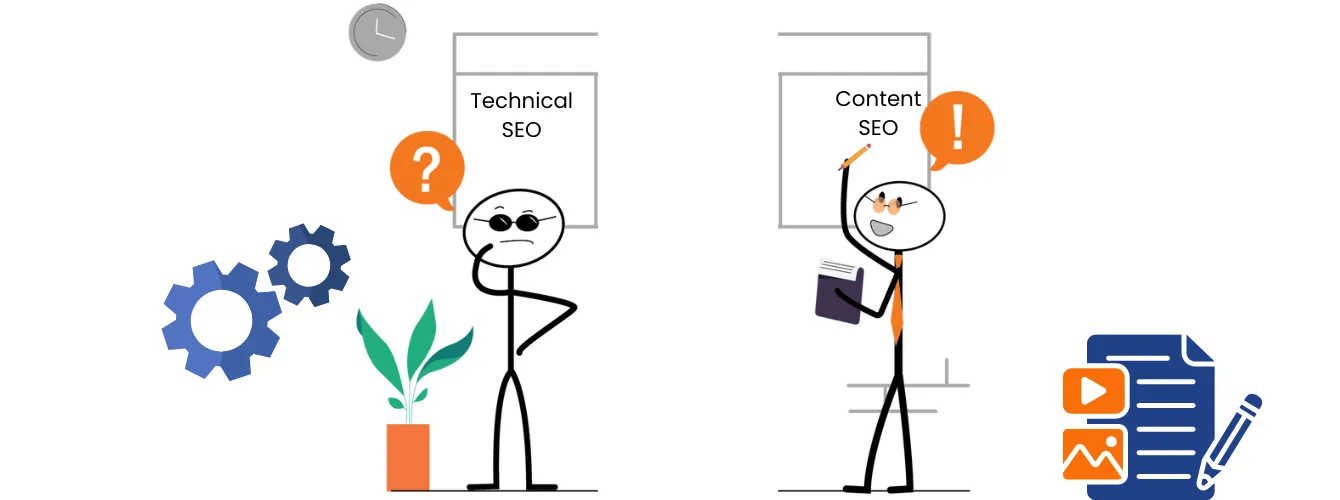One of the biggest questions business owners and marketers ask is, “How long does SEO take?” Search Engine Optimization (SEO) is an ongoing process that enhances your website’s visibility in search results. While you can expect to see initial results within 3-6 months, the exact timeline varies depending on your website.
SEO is a multifaceted, long-term strategy. It’s critical to understand the factors influencing your SEO timeline to set realistic expectations and develop effective strategies. Remember, SEO is not a one-time fix. Consistent effort is key to achieving noticeable improvements in rankings and organic traffic. In some cases, it may take up to a year to see consistent growth.
For a deeper understanding of how long SEO takes and to see a typical SEO timeline, keep reading. Alternatively, you can contact us online to speak with an SEO expert about your business.
We’ll explore the key elements that determine your SEO timeline and the milestones you can expect along the way.
Understanding How Long SEO Takes
SEO is not an overnight process; it typically takes three to six months to start seeing significant results. This journey involves implementing a variety of strategies and continuous efforts that gradually build up over time. Achieving and maintaining high search engine rankings requires ongoing optimization and the ability to adapt to ever-evolving algorithm changes. Patience and persistence are key, as the true power of SEO lies in its cumulative and long-term impact.
Why SEO Takes So Long
SEO is a multifaceted approach that involves technical, on-page, and off-page optimization. The process takes time because it focuses on building authority, trust, and relevance in the eyes of search engines. Here are some key reasons why SEO is inherently a long-term game:
Algorithm Complexity
Search engines use sophisticated algorithms that evaluate hundreds of factors to determine rankings. These algorithms are constantly updated and refined, requiring ongoing efforts to stay aligned with best practices.
Competition
In highly competitive niches, it takes more time and effort to outrank established players. Competitors who have been in the game longer often have stronger backlink profiles, more content, and greater domain authority.
Trust Building
Establishing your website as a trustworthy and authoritative source takes time. This involves consistently publishing high-quality content, earning quality backlinks, and demonstrating expertise, authority, and trustworthiness (E-A-T) in your industry.
Factors Influencing SEO Timelines
Website History and Domain Age
Older, established websites often see quicker results because they already have some level of authority and trust built up. New websites start from scratch, which means it takes longer to build credibility with search engines.
Competition
The level of competition in your industry impacts how long SEO takes. Highly competitive industries require more time and resources to achieve significant rankings compared to less competitive ones.
Keyword Difficulty
Targeting high-difficulty keywords with a lot of competition takes longer to rank for than low-difficulty keywords. A strategic mix of both can help achieve quicker wins while working towards more competitive terms.
Content Quality and Quantity
Regularly publishing high-quality content is essential. Search engines prioritize websites that offer valuable, relevant, and engaging content. Developing a robust content strategy can significantly impact your SEO timeline.
Backlink Profile
The quantity and quality of backlinks pointing to your website are critical ranking factors. Building a strong backlink profile with links from reputable and relevant websites takes time but is crucial for SEO success.
Typical SEO Timeline
Initial Results (1-3 months)
In the first few months, you might see minor improvements in crawl rates, indexing, and some ranking fluctuations. Initial results are often more noticeable for less competitive keywords.
Intermediate Progress (4-6 months)
Between four to six months, you should start seeing more substantial improvements. Your website may begin to rank for targeted keywords, leading to increased organic traffic. However, significant gains are often dependent on the competitiveness of your industry.
Long-Term Success (6-12+ months)
Achieving long-term SEO success typically takes six to twelve months or more. By this time, you should see consistent improvements in rankings, organic traffic, and overall online visibility. Ongoing efforts are necessary to maintain and build upon these gains.
Key Milestones in the SEO Process
Site Audit and Analysis
The initial steps involve conducting a comprehensive site audit to identify technical issues, assess on-page SEO factors, and evaluate the overall health of your website.
Keyword Research
Identifying and prioritizing relevant keywords based on their difficulty and potential impact is crucial. This process guides your content strategy and can take several weeks to complete thoroughly.
Content Creation and Optimization
Developing and optimizing content around your target keywords is an ongoing process. Depending on the amount of content needed, this phase can take several months.
Link Building
Building a robust backlink profile requires strategic outreach and time. Effective strategies include developing relationships with industry influencers and earning links through high-quality content.
Monitoring and Adjustments
SEO requires continuous monitoring and adjustments based on performance data. This ongoing process ensures your strategy remains effective and adapts to changes in search engine algorithms.
Common SEO Myths and Misconceptions
SEO is a One-Time Effort
SEO is not a one-time task but a continuous process. Search engine algorithms constantly evolve, and maintaining and improving your rankings requires ongoing effort.
Guaranteed Quick Results
Promises of quick results are unrealistic. While initial improvements can be seen within a few months, significant and sustainable gains typically take longer.
More Content Equals Better SEO
While content quantity is important, quality is paramount. Producing a large volume of low-quality content won’t yield desired results. Focus on creating valuable, well-optimized content.
Tools and Resources to Speed Up SEO
SEO Tools
Utilizing SEO tools can streamline your efforts and provide valuable insights. Popular tools include Google Analytics, Ahrefs, SEMrush, Moz, and Screaming Frog.
Educational Resources
Staying informed about the latest SEO trends and best practices is crucial. Recommended resources include Google Search Central, blogs like Moz Blog, Search Engine Land, and Backlinko, as well as courses on platforms like Coursera, Udemy, and LinkedIn Learning.
Conclusion
Achieving SEO success requires time, effort, and patience. By understanding the factors that influence SEO timelines and setting realistic expectations, you can develop an effective strategy that delivers long-term results. Remember, SEO is a continuous process that requires regular monitoring, adjustments, and dedication.







